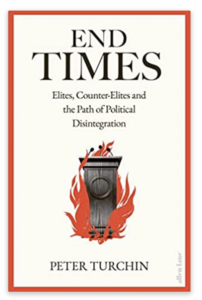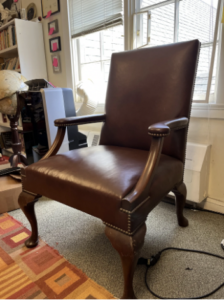Quote of the Day
”The difficulty lies not so much in developing new ideas as in escaping from old ones.”
- John Maynard Keynes
Seen while walking through King’s yesterday afternoon.
Musical alternative to the morning’s radio news
Sharon Shannon and Dessie O’Halloran | Say You Love Me
Long Read of the Day
The chronicle of the revolutions foretold?
Terrific and informative review by economist Branco Milanovic of Peter Turchin’s forthcoming book.
For almost two decades, Peter Turchin has been involved, with many colleagues and co-authors, in an epochal project: to figure out, using quantifiable evidence, what are the forces that lead to the rise, and more importantly, to the decline of nations, political turbulence and decay, and revolutions. This has resulted in the creation of an enormous database (CrisisDB) covering multitude of nations and empires over centuries, and several volumes of Turchin’s writings (e.g., Secular Cycles (with Sergey Nefedov), War and Peace and War; I have read the former, not the latter).
End Times is Turchin’s attempt to break to the broader public what he has learned from the complex work in the field that he calls Cliodynamics. It is a work of “haute vulgarisation” even if the adjective “haute” is sometimes inapplicable since, in his attempt to reach the broadest possible audience, Turchin has at times stylistically gone much too low assuming almost no prior knowledge amongst his readers. But this is a question of style.
What is the substance? To simplify, in my turn: Turchin’s model of decay has one variable: inequality in income or wealth. That variable which is often adduced as a source of political discord is given a very concrete meaning by Turchin…
I guess the main criticism of Turchin’s work is that single causal factors are implausible predictors of societal breakdown and political crises/discontinuities. But Milanovic has a good discussion of all that.
I wonder how long it will take for the current trajectory we’re on — of apparently inexorable increases in inequality — to reach catastrophic levels for democracy.
In the meantime, this review is worth your time.
Turchin’s book comes out in June. It’s on my list.
My commonplace booklet
What should Robert Reich do with his cabinet chair?
Professor Robert Reich is about to retire from UC Berkeley, where he has taught for decades, and is clearing his office. In doing this, he faces two problems: one is what to do with his books.
The other — bigger — problem, he writes,
is my Cabinet chair — the chair I sat in at Cabinet meetings when I was secretary of labor.
By tradition, Cabinet members purchase their Cabinet chairs when they leave the government. When I left the Labor Department 26 years ago, my staff bought the chair for me as a going-away gift. I was touched at the time. Now, I’m befuddled.
It’s heavy and ugly — a clunky late 18th century design that’s been standard in the Cabinet room since William Howard Taft was president.
It’s also huge. When I sit in it, my legs shoot straight out like Lily Tomlin playing Edith Ann.
And it’s personalized. When you join the Cabinet, a small engraved brass plate is attached to the back of your Cabinet chair showing the date you started (in my case, January 21, 1993). Another is attached when you leave, with the date of your departure (January 12, 1997).
In the end, he decided that the best thing to do would be to return it to the White House and request that they recycle it. So he rang the White House switchboard.
You can imagine the subsequent conversation. Click the link to find out if your guess was correct.
This Blog is also available as a daily email. If you think that might suit you better, why not subscribe? One email a day, Monday through Friday, delivered to your inbox. It’s free, and you can always unsubscribe if you conclude your inbox is full enough already!


